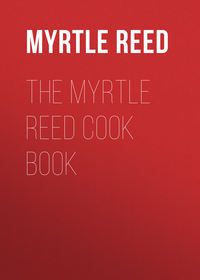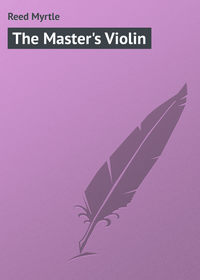 полная версия
полная версияMaster of the Vineyard
She began to clear away the supper dishes, for, though the others had eaten little, they had apparently finished. Out in the kitchen, she sang as she worked, and only a close observer would have detected a tremor in the sweet, untrained soprano. "Anyway," thought Rosemary, "I'll put on the flat-irons."
The fire she had built would not go out for some hours. She had used coal ruinously in order to heat the oven for a special sort of tea-biscuit of which Grandmother was very fond. While the fire was going out, it would heat the irons, and then —
"One step forward whenever there is a foothold," she said to herself, "and trust to God for the next."
That night, as fortune would have it, Grandmother and Aunt Matilda elected to sit up late, solving a puzzle in The Household Guardian for which a Mission rocker was offered as a prize. It was long past ten o'clock when they gave it up.
"I dunno," yawned Aunt Matilda, "as I'm partial to rockers."
"Leastways," continued Grandmother, rising to put her spectacles on the mantel, "to the kind they give missionaries. I've seen the things they send missionaries more'n once, in my time."
More than One WayBy eleven, the household slept, except Rosemary. As silently as a ghost, she made her way to the attic, brought down the clean white muslin, and, with irons scarcely hot enough, pressed it into some semblance of freshness. She hung it in her closet, under the brown alpaca of two seasons past, and went to sleep, peacefully.
Bright and early the next morning the Idea presented itself. Why not put on the white gown with one of the brown ones over it and take off the brown one when she got there? Mrs. Marsh would understand.
Rosemary laughed happily as she climbed out of bed. Surely there was more than one way of cheating Fate! That afternoon, while the others took their accustomed "forty winks," she brought down the faded pink ribbon that had been her mother's. That night she discovered that neither of the brown ginghams would go over the white muslin, as they had shrunk when they were washed, but that the alpaca would. There was not even a bit of white showing beneath the skirt, as she had discovered by tilting her mirror perilously forward.
She was up early Saturday morning, and baked and swept and dusted to such good purpose that, by three o'clock, there was nothing more that anyone could think of for her to do until it was time to get supper. She had put the white gown on under the alpaca when she dressed in the morning, as it was the only opportunity of which she was at all sure.
Hung in the BalanceGrandmother and Aunt Matilda were nodding in their chairs. The kitchen clock struck the half hour. Finally, Rosemary spoke.
"Is there anything either of you would like me to get at the store?"
"No," said Grandmother.
"No," echoed Aunt Matilda. Then she added: "Why? Were you thinkin' of goin' out?"
"I thought I would," said Rosemary, with a yawn, "if there was nothing more for me to do. It's such a nice day, and I'd like a breath of fresh air."
For a moment, Fate hung in the balance, then Grandmother said, generously: "Go on, Rosemary, and get all the fresh air you want. You've worked better'n common to-day."
"I should think you'd be tired enough to stay home and rest," Aunt Matilda commented, fretfully, but the door had closed on the last word, and Rosemary was gone.
"But April's sun strikes down the glades to-day;So shut your eyes upturned, and feel my kissCreep, as the Spring now thrills through every sprayUp your warm throat to your warm lips – "Rosemary Meets EdithThe beautiful words sang themselves through her memory as she sped on. She had forgotten about the guest for the moment, remembering with joy that almost hurt, the one word "Mother," and the greater, probable joy that overshadowed it. Of course he would be there! Why not, when he knew she was coming to tea – and when they had a guest, too? The girl's heart beat tumultuously as she neared the house, for through it, in great tides, surged fear, and ecstasy – and love.
Madame herself opened the door. "Come in, dear!"
"Oh, Mrs. Marsh! Please, just a minute!"
"Mrs. Marsh again? I thought we were mother and daughter. Edith!" she called. Then, in the next moment, Rosemary found herself in the living-room, offering a rough, red hand to an exquisite creature who seemed a blurred mass of pale green and burnished gold, redolent of violets, and who murmured, in a beautifully modulated contralto: "How do you do, Miss Starr! I am very glad to meet you."
The consciousness of the white gown underneath filled Rosemary's eyes with tears of mortification, which Madame hastened to explain. "It's raw and cold still," she said, "in spite of the calendar. These keen Spring winds make one's eyes water. Here, my dear, have a cup of tea."
An Uncomfortable AfternoonRosemary took the cup with hands that trembled, and, while she sipped the amber fragrance of it, struggled hard for self-possession. Madame ignored her for the moment and chatted pleasantly with Edith. Then Alden came in and shook hands kindly with Rosemary, though he had been secretly annoyed when he learned she was coming. Afterward, he had a bad quarter of an hour with himself while he endeavoured to find out why. At last he had shifted the blame to Edith, deciding that she would think Rosemary awkward and countrified, and that it would not be pleasant for him to stand by and see it.
However, the most carping critic could have found no fault with Edith's manner. If she felt any superiority, she did not show it. She accorded to Rosemary the same perfect courtesy she showed Madame, and, apparently, failed to notice that the girl had not spoken since the moment of introduction.
She confined the conversation wholly to things Rosemary must have been familiar with – the country, the cool winds that sometimes came when one thought it was almost Summer, the perfect blend of Madame's tea, the quaint Chinese pot, and the bad manners of the canary, who seemed to take a fiendish delight in scattering the seed that was given him to eat.
Looking into the Crystal BallRosemary merely sat in the corner, tried to smile, and said, as required, "Yes," or "No." Alden, pitying her from the depths of his heart and yet secretly ashamed, tried unsuccessfully, now and then, to draw her into the conversation.
Edith drained her cup, affected disappointment at finding no stray leaves by which she might divine the future, then went to Rosemary, and took the empty cup which she sat holding with pathetic awkwardness.
"You have none, either, Miss Starr," she said, sweetly. "Suppose we try the crystal ball? I've been wanting to do it ever since I came, but was afraid to venture, alone."
Rosemary, her senses whirling, followed her over to the table, where the ball lay on its bit of black velvet.
"How do you do it?" asked Edith, of Madame.
"Just get into a good light, shade your eyes, and look in."
"That's easy," Edith said. She bent over the table, shaded her eyes with her white, beautifully-kept hands, and peered into the crystalline depths. "There's nothing here," she continued, somewhat fretfully, to Alden, "except you. By some trick of reflection, I could see you as plainly as though it were a mirror. You try, Miss Starr."
Madame's heart contracted suddenly as she remembered the day she had looked into the crystal ball, and had seen not only Alden, but a woman with flaming red hair, clasped closely in his arms. "It's all nonsense," she tried to say, but her stiff lips would not move.
A Black CloudRosemary left the table and went back to her corner. "What did you see?" queried Edith. "Did you have any better luck than I did?"
"No," Rosemary answered, with a degree more of self-possession than she had shown previously. "There was nothing there but a black cloud."
The task of keeping up the conversation fell to Edith and Alden, for Madame had unconsciously withdrawn into herself as some small animals shut themselves into their shells. All were relieved, though insensibly, when Rosemary said she must go.
Alden went into the hall with her, to help her with her coat and hat, and, as opportunity offered, to kiss her twice, shyly, on her cheek. He wanted to go part way home with her, but Rosemary refused.
"You'd better not," she said, "but thank you just as much."
"Won't you even let me go to the corner with you?"
"No," said Rosemary, with trembling lips, "please don't."
So she went on alone, while Alden returned to the living-room. Edith was saying to Madame: "Poor little brown mouse! How one longs to take a girl like that and give her all the pretty things she needs!"
Edith's Desire for RosemaryMadame took the crystal ball, wrapped it in its bit of velvet, and put it on the highest shelf of the bookcase, rolling it back behind the books, out of sight.
"Why do you do that, Mother?" asked Alden, curiously. "Because," returned Madame, grimly, "it's all nonsense. I won't have it around any more."
Alden laughed, but Edith went on, thoughtfully: "I'd like to do her hair for her, and see that all her under-things were right, and then put her into a crêpe gown of dull blue – a sort of Chinese blue, with a great deal of deep-toned lace for trimming, and give her a topaz pendant set in dull silver, and a big picture hat of ecru net, with a good deal of the lace on it, and one long plume, a little lighter than the gown."
"I would, too," said Alden, smiling at Edith. He did not in the least know what she was talking about, but he knew that she felt kindly toward Rosemary, and was grateful for it.
Rosemary, at home, went about her duties mechanically. There was a far-away look in her eyes which did not escape the notice of Grandmother and Aunt Matilda, but they forebore to comment upon it as long as she performed her tasks acceptably. At supper she ate very little, and that little was as dust and ashes in her mouth.
HeartburnsBefore her, continually, was a heart-breaking contrast. She, awkward, ugly, ill at ease in brown alpaca made according to the fashion of ten or fifteen years ago, and Mrs. Lee, beautiful, exquisite, dainty to her finger-tips, richly dowered with every conceivable thing that she herself lacked.
"Mother," said Rosemary, to herself. "Oh, Mother!" She did not mean Mrs. Marsh, but the pretty, girlish mother who had died in giving birth to her. She would have been like Mrs. Lee, or prettier, and she would have understood.
Her heart smarted and burned and ached, but she got through the evening somehow, and, at the appointed time, stumbled up to her own room.
Why should she care because another woman was prettier than she, knew more, and had more? Were there not many such in the world, and had she not Alden? Accidentally, Rosemary came upon the cause of her pain.
Of course she had Alden, for always – unless – then, once more, reassurance came. "She's married," said Rosemary, smiling back at the white, frightened face she saw in the mirror. "She's married!"
The Comforting ThoughtThe thought carried with it so much comfort that presently Rosemary slept peacefully, exhausted, as she was, by the stress of the afternoon. "She's married," was her last conscious thought, and a smile lingered upon her lips as she slept. She had not enough worldly wisdom to know that, other things being equal, a married woman may be a dangerous rival, having the unholy charm of the unattainable, and the sanction of another man's choice.
XI
The Hour of the Turning Night
Awake in the NightThe darkness was vibrant, keen, alive. It throbbed with consciousness, with mysterious fibres of communication. There was no sense of a presence in the room, nor even the possibility of a presence. It was vague, abstract, yet curiously definite.
Edith woke from a troubled dream with a start. For a moment she lay quietly and listened, not afraid, but interested, as though upon the threshold of some new experience. The scurrying feet of mice made a ghostly patter in the attic, above her room, and a vagrant wind, in passing, tapped at her window with the fairy-like fingers of the vine that clung to the wall.
Otherwise all was still, and yet the darkness trembled with expectancy. Something hitherto unknown seemed to have entered her consciousness, some thought, emotion, instinct, or what? Wide awake, staring into space, she lay there, wondering, waiting, not in the least frightened, but assured of shelter and of peace.
Another PersonalityGradually she had lost consciousness of her body. She had relaxed completely and her mind soared, free. She moved one foot, cautiously, to see whether her body was still there, and smiled when she was reassured by the cool smoothness of the linen sheet, and the other warm little foot she touched in moving.
Somewhere, in this same darkness, was another personality. Of so much she eventually became sure. It was not in the room, perhaps not even in the house, but for someone else, somewhere, was this same sense – of communication? No, but rather the possibility of it.
Someone else had also lost consciousness of the body. Another mind, released for the moment from its earthly prison, sought communion with hers. Was this death, and had she wakened in another world? She moved her foot again, pressed her hand to the warm softness of her breast, felt her breath come and go, and even the steady beating of her heart. Not death, then, only a pause, in which for once the body, clamorous and imperious with its thousand needs, had given way to the soul.
The curious sense of another personality persisted. Was this other person dead, and striving mutely for expression? No, surely not, for this other mind was on the same plane as hers, subject to the same conditions. Not disembodied entirely, but only relaxed, as she was, this other personality had wakened and found itself gloriously free.
A New SelfA perception of fineness followed. Not everyone was capable of this, and the conviction brought a pleasant sense of superiority. Above the sordid world, in some higher realm of space and thought, they two had met, and saluted one another.
For the first time Edith thought of her body as something separate from herself, and in the light of a necessary – or unnecessary – evil. This new self neither hungered nor thirsted nor grew weary; it knew neither cold nor heat nor illness; pain, like a fourth dimension, was out of its comprehension, it required neither clothes nor means of transportation, it simply went, as the wind might, by its own power, when and where it chose.
Whose mind was it? Was it someone she knew, or someone she was yet to meet? And in what bodily semblance did it dwell, when it was housed in its prison? Was it a woman, or a man? Not a woman – Edith instantly dismissed the idea, for this sense of another personality carried with it not the feeling of duality or likeness, but of difference, of divine completion.
Some man she knew, or whom she was to know, freed for the moment from his earthly environment, roamed celestial ways with her. She was certain that it was not lasting, that, at the best, it could be of very brief duration, and this fact of impermanence was the very essence of its charm, like life itself.
Who Was the Man?The clock down-stairs began to strike – one, two, three – four. It was the hour of the night when life is at its lowest, the point on the flaming arc of human existence where it touches the shadow of the unknown, softening into death or brightening into life according to the swing of the pendulum. Then, if ever, the mind and body would be apart, Edith thought, for when the physical forces sink, the spirit must rise to keep the balance true.
Who was the man? Her husband? No, for they were too far apart to meet like this. She idly went over the list of her men acquaintances – old schoolmates, friends of her husband's, husbands of her friends, as one might call the roll of an assembly, expecting someone to rise and answer "Here."
Yet it was all in vain, though she felt herself on the right track and approaching a definite solution. The darkness clung about her like a living thing. It throbbed as the air may when a wireless instrument answers another, leagues away; it was as eloquent of communication as a network of telephone and telegraph wires, submerged in midnight, yet laden with portent of life and death.
She sat up in bed, straining every nerve to the point where all senses unite in one. "Who are you?" Her lips did not move, but the thought seemed to have the sound of thunder in its imperious demand. Tangled fibres of communication noiselessly wove themselves through the darkness, and again all her soul merged itself into one question – "Who? For God's sake, who?"
The AnswerThen, after a tense instant of waiting, the answer flashed upon her, vivid as lightning: "Alden Marsh!"
And swiftly, as though in response to a call, a definite, conscious thought from the other personality presented itself: "Yes? What would you have of me?"
Edith lay back among her pillows, as the clock struck the half hour. The body, as though resentful of denial, urged itself swiftly upon her now. Her heart beat tumultuously, her hands shook, she thrilled from head to foot with actual physical pain. The darkness no longer seemed alive, but negative and dead, holding somewhere in its merciful depths the promise of rest.
Utterly exhausted, she closed her eyes and slept, to be roused by a tap at her door.
"Yes," she answered, drowsily, "come in!"
Madame came in, pulled up the shades and flooded the room with sunshine. "I'm sorry if I've disturbed you, dear, but I was afraid you were ill. I've been here twice before."
Aroused from SleepEdith sat up and rubbed her eyes. "What time is it?"
"Half-past nine."
"Oh, I'm so sorry! You mustn't spoil me this way, for I do want to get up to breakfast. Why didn't you call me?"
Madame sat down on the side of the bed and patted Edith's outstretched hand with affectionate reassurance. "You're to do just as you please," she said, "but I was beginning to worry a bit, for you've been the soul of punctuality."
"Did – " Edith closed her lips firmly upon the instinctive question, "Did he miss me?" She dismissed it as the mere vapouring of a vacant brain.
"Did what?" asked Madame, helpfully.
"Did you miss me?"
"Of course. Alden did too. The last thing he said before he went to school was that he hoped you were not ill."
"That was nice of him." Edith put a small pink foot out of bed on the other side and gazed at it pensively. Madame laughed.
"I don't believe you've grown up," she said. "You remind me of a small child, who has just discovered her toes. Do you want your breakfast up here?"
"No, I'll come down. Give me half an hour and I'll appear before you, clothed and in my right mind, with as humble an apology for my sins as I'm able to compose in the meantime."
Call of the Wander-LustShe was as good as her word, appearing promptly at the time she had set, and dressed for the street. After doing justice to a hearty breakfast, she said that she was going out for a walk and probably would not be back to luncheon.
"My dear!" exclaimed Madame. "You mustn't do that. I'll have luncheon kept for you."
"No, please don't, for I really shan't want any. Didn't you observe my breakfast? Even a piano-mover couldn't think of eating again before seven, so let me go a-gypsying till sunset."
Madame nodded troubled acquiescence, and, with a laugh, Edith kissed her good-bye. "I'm subject to the Wander-lust," she said, "and when the call comes, I have to go. It's in my blood to-day, so farewell for the present."
Madame watched her as she went down the street, the golden quill on her green hat bidding jaunty defiance to the wind. As she had said, she felt the call at times, and had to yield to its imperative summons, but to-day it was her soul that craved the solace of the open spaces and the wind-swept fields.
As she dressed, she had tried to dismiss last night's experience as a mere fantasy of sleep, or, if not an actual dream, some vision hailing from the borderland of consciousness, at the point where the senses merge. Yet, even as she argued with herself, she felt the utter futility of it, and knew her denials were vain in the face of truth.
Roaming through the VillageShe dreaded the necessity of meeting Alden again, then made a wry face at her own foolishness. "Ridiculous," she said to herself, "preposterous, absurd!" No matter what her own nightmares might be, he slept soundly – of course he did. How could healthy youth with a clear conscience do otherwise?
For an hour or more, she kept to the streets of the village, with the sublime unconsciousness of the city-bred, too absorbed in her own thoughts to know that she was stared at and freely commented upon by those to whom a stranger was a source of excitement. Her tailored gown, of dark green broadcloth, the severe linen shirtwaist, and her simple hat, were subjects of conversation that night in more than one humble home, fading into insignificance only before her radiant hair. The general opinion was that it must be a wig, or the untoward results of some experiment with hair-dye, probably the latter, for, as the postmaster's wife said, "nobody would buy a wig of that colour."
The school bell rang for dismissal, and filled her with sudden panic. After walking through the village all the morning to escape luncheon with Alden, it would be disagreeable to meet him face to face almost at the schoolhouse door. Turning in the opposite direction, she walked swiftly until she came to a hill, upon which an irregular path straggled half-heartedly upward.
The Finding of the Red BookSo Edith climbed the Hill of the Muses, pausing several times to rest. When she reached the top, she was agreeably surprised to find a comfortable seat waiting her, even though it was only a log rolled back against two trees. She sank back into the hollow, leaned against the supporting oak, and wiped her flushed face.
Others had been there before her, evidently, for the turf was worn around the log, and there were even hints of footprints here and there. "Some rural trysting place, probably," she thought, then a gleam of scarlet caught her attention. A small red book had fallen into the crevice between the log and the other tree. "The House of Life," she murmured, under her breath. "Now, who in this little village would – unless – "
The book bore neither name nor initials, but almost every page was marked. As it happened, most of them were favourite passages of her own. "How idyllic!" she mused; "a pair of young lovers reading Rossetti on a hill-top in Spring! Could anything be more pastoral? I'll take it back to the house and tell about it at dinner."
Mutually SurprisedShe welcomed it as a sure relief from a possible awkward moment. "I knew I was right," she said to herself, as she turned the pages. "To-day was set aside, long ago, for me to go a-gypsying."
The clear air of the heights and the sunlit valley beneath her gave her a sense of proportion and of value which she realised she had sadly needed. Free from the annoyances of her daily life, she could look back upon it with due perspective, and see that her unhappiness had been largely caused by herself.
"I can't be miserable," she thought, "unless I'm willing to be."
She sat there for a long time, heedless of the passing hours. She was roused from her reverie by a muffled footstep and an involuntary exclamation of astonishment.
"Why, how do you do, Miss Starr?" said Edith, kindly, offering a well-gloved hand. "Are you out gypsying too?"
"Yes," Rosemary stammered. Her eyes were fixed upon the small red book that Mrs. Lee held in her other hand.
"See what I found," Edith went on, heedlessly. "Rossetti's House of Life, up here. Boy Blue must have brought it up to read to Bo-Peep in the intervals of shepherding. There may not be any such word as 'shepherding,' but there ought to be, I love to make words, don't you?"
Shrines Laid Bare"Yes," said Rosemary, helplessly. She had thought Alden had the book, but had forgotten to make sure, and now the most precious hours of her life had been invaded and her shrines laid bare. Was it not enough for this woman to live in the same house with Alden? Need she take possession of the Hill of the Muses and the little book which had first awakened her, then brought them together? Resentful anger burned in her cheeks, all the more pitiful because of Mrs. Lee's utter unconsciousness, and the impossibility of reparation, even had she known.







